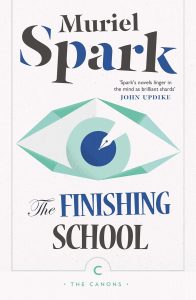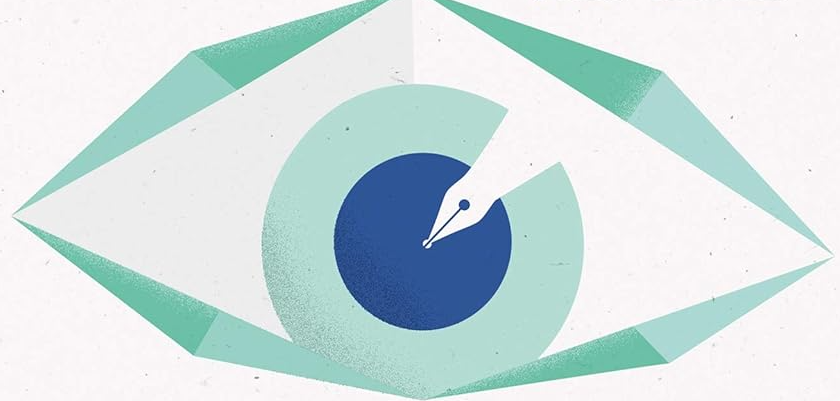
Muriel Spark was 86 years old when her witty, biting novel The Finishing School was released. The novel crowned an immensely productive writing career. We meet Rowland Mahler, the young founder of a small, dubious private school in Switzerland. His growing jealousy of a clever 17-year old student drives him to madness. Rowland is an aspiring writer and teaches creative writing at College Sunrise, which he runs with the help of his more capable, down-to-earth wife, Nina. One of his teenage students, Chris, is also a fledgling novelist and already more accomplished than Rowland. Chris is on his way to completing his debut novel and appears to have a publisher already lined up. It’s less the quality of the draft manuscript that excited publishers, but rather the novelty of a seventeen year old writing historical fiction based on a “unique” theory around the life, times and death of Mary Queen of Scots. To say that Rowland doesn’t take kindly to his student’s success is how one might describe the situation when in polite company. Plainly put: Rowland wants Chris dead and while contemplating ways to do him in, his obsession spirals entirely out of control. But Spark gradually reveals to us that Chris and Rowland are in a destructive, co-dependent relationship.
Nina and Rowland’s “finishing School” isn’t a Victorian-inspired stuffy, severe throw-back that one might believe it is, based on the title of the book. It’s a “mobile” or travelling school for a small handful of European families that can pay to be unburdened of their children for a semester. Their teenage kids are taken to whatever continental location the school happens to use as its base. The school has just moved to the shores of Lake Geneva, in Lausanne, Switzerland. They have less than a dozen students at any given time, a small handful of staff balancing multiple roles and they lease a house where the pupils live and, to some degree, learn. Most of the knowledge they acquire are life lessons that can’t be found in textbooks.
Nina teaches what she calls “comme il faut” classes. On paper, they’re about etiquette. In reality, she’s imparting street smarts to her students. She explains to them: “When you finish at College Sunrise you should be really and truly finished. Like the finish on a rare piece of furniture. Your jumped-up parents (May God preserve their bank accounts) will want to see something for their money.” One of her comme il faut lessons is about how “hypocrisy makes the world go round.” She has an exchange with her high school students that reveals much about her outlook, as well as the situation, backgrounds and ambitions of her students:
“Is it difficult to be a hypocrite?” said Mary Foot. She was thinking of her ceramics shop-to-be.
“Not very much,” said Nina. “We do it in civilized society the whole time, in fact.”
Opal Gross, her family having faced the financial crash, was in some difficulties about her future. She asked Nina, “Do you have to be a hypocrite if you have a career in the Church?”
“Oh, yes. What I say applies to the Church very much.”
“The Anglican Church?”
“Any church.” Nina knew that Opal thought of becoming an Anglican priest as a solution to her problems, spiritual and material.”
In Spark’s novel, characters are often frauds — more concerned with establishing themselves in the temporal world and interested in personal material success than with the lofty ideals that they purport drives them. In this story, we see that Nina, despite her young age, has a deeply cynical view of the world; one that she is happy to share with a new generation. The pupils include one who calls herself Princess Tilly, even though her claim to nobility is unverifiable. Another student’s father is a gangster on the run. Nina, a social climber, likes to invite various washed-out academics to give guest lectures at the school. In most cases, these scholars either have an undeserved air of self-importance or they’re just happy to be offered an honorarium and be sent on a paid trip with free accommodation. Chris, the teenage genius and aspiring author, isn’t the bright-eyed, naively ambitious young man he initially appears to be. He’s knavish, manipulative, highly perceptive, corrupt and ready to corrupt others too. We’re told several times of his red hair — Spark sprinkles these references throughout the novel like red flags. The editors, agents and publishers mentioned in the novel barely read the manuscripts submitted to them and make decisions on what to accept or reject based mostly on whether the author’s personality or life situation can sell.
As Chris becomes aware of Rowland’s escalating envy, he does what he can to push his teacher over the precipice into madness. Rowland’s marriage to Nina begins to crumble as his obsession with Chris consumes all. Whispers spread throughout the school about whether Rowland might be attracted to Chris romantically or sexually. Nina’s lover, an open secret in the school, is an art gallerist called Israel Brown who has a different explanation of what may be the matter with Rowland. According to Israel Brown, every problem is fundamentally a spiritual or a religious problem. He convinces Nina that her husband needs to be sent off to a monastery on a spiritual retreat during which time — conveniently — the two can conduct their affair with greater ease. We read:
According to the catechism of the Roman Catholic faith, into which Rowland had been born, six sins against the Holy Spirit are specified. The fourth is “Envy of Another’s Spiritual Good,” and that was the sin from which Rowland suffered. Suffered is the right word, as it often is in the case where the perpetrators are in the clutches of their own distortions. With Rowland, his obsessive jealousy of Chris was his greatest misfortune. And jealousy is an affliction of the spirit which, unlike some sins of the flesh, gives no-one any pleasure.
This being a satirical novel, full and earnest spiritual healing isn’t really the point. Chris follows Rowland to the monastery and checks in. Who is stalking whom, who is obsessed with whom? The spiritual retreat isn’t entirely successful, so Rowland is put on tranquilizers to manage his obsessive conduct. Yet these scenes tell us something of what Spark herself believes. She thinks humans are misguided and even delusional in believing that they’re in control, when they’re not and can never be. Only God is in control. We see this same theme of control, and the desire for it, in novels like The Driver’s Seat and in Memento Mori. And it’s at the heart of this funny, savage story too — which also explores to what degree authors play God and fully control their characters.
College Sunrise, where pupils and staff are well and truly finished, reminds me a little of the dysfunctional hotel in the seventies British sitcom Fawlty Towers. There’s a bit of Basel in Rowland and a little Sybil in Nina. The more serious theme, however, is how this almost “fly-by-night” private school flies under the radar of accountability by travelling from one location to another, being concerned entirely with image and undeserved reputation, serving the needs of absent parents and families who are happy to cart their kids off as far away as possible. Spark may not leave the reader with warm feelings about human nature, but she’ll certainly draw one in with her precise prose and humour.

Be First to Comment